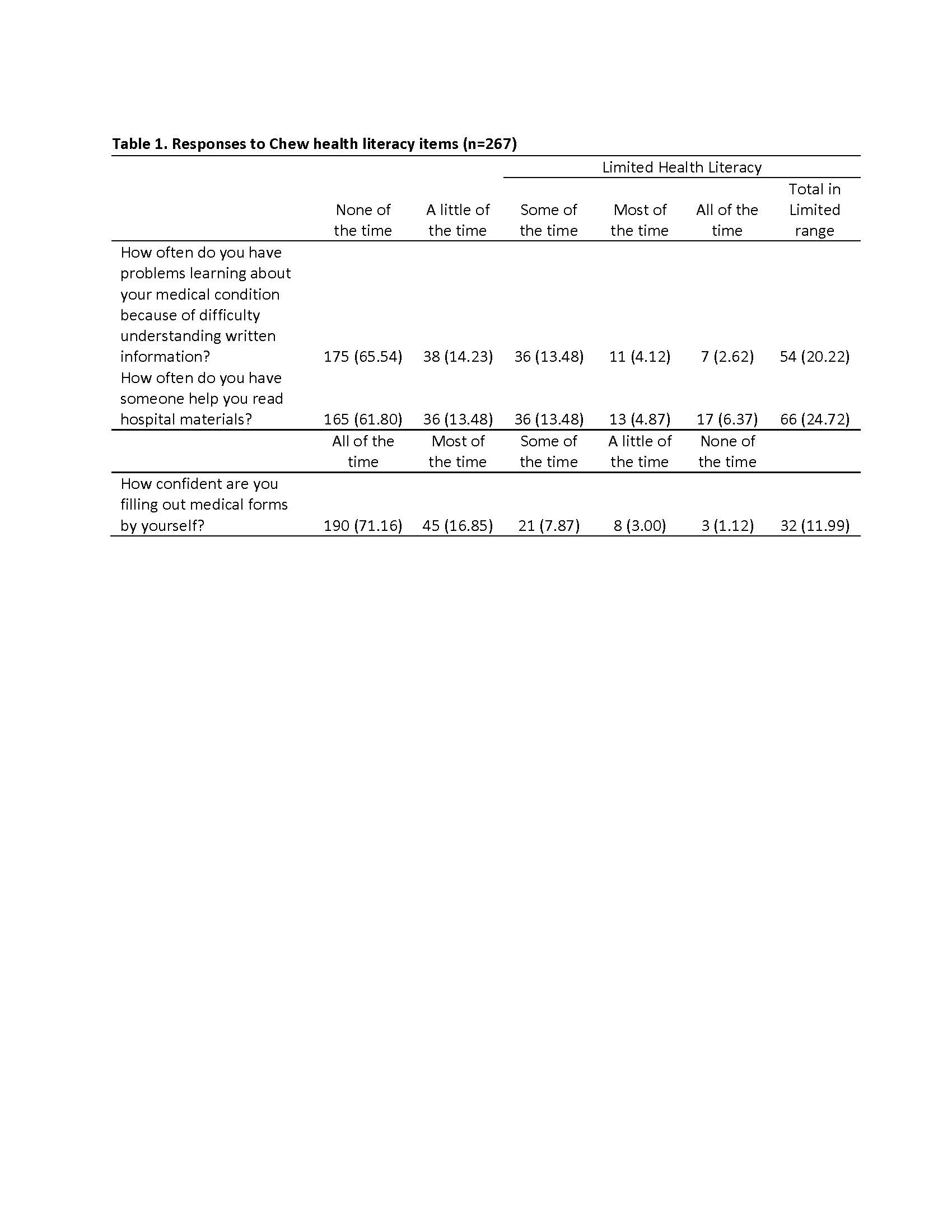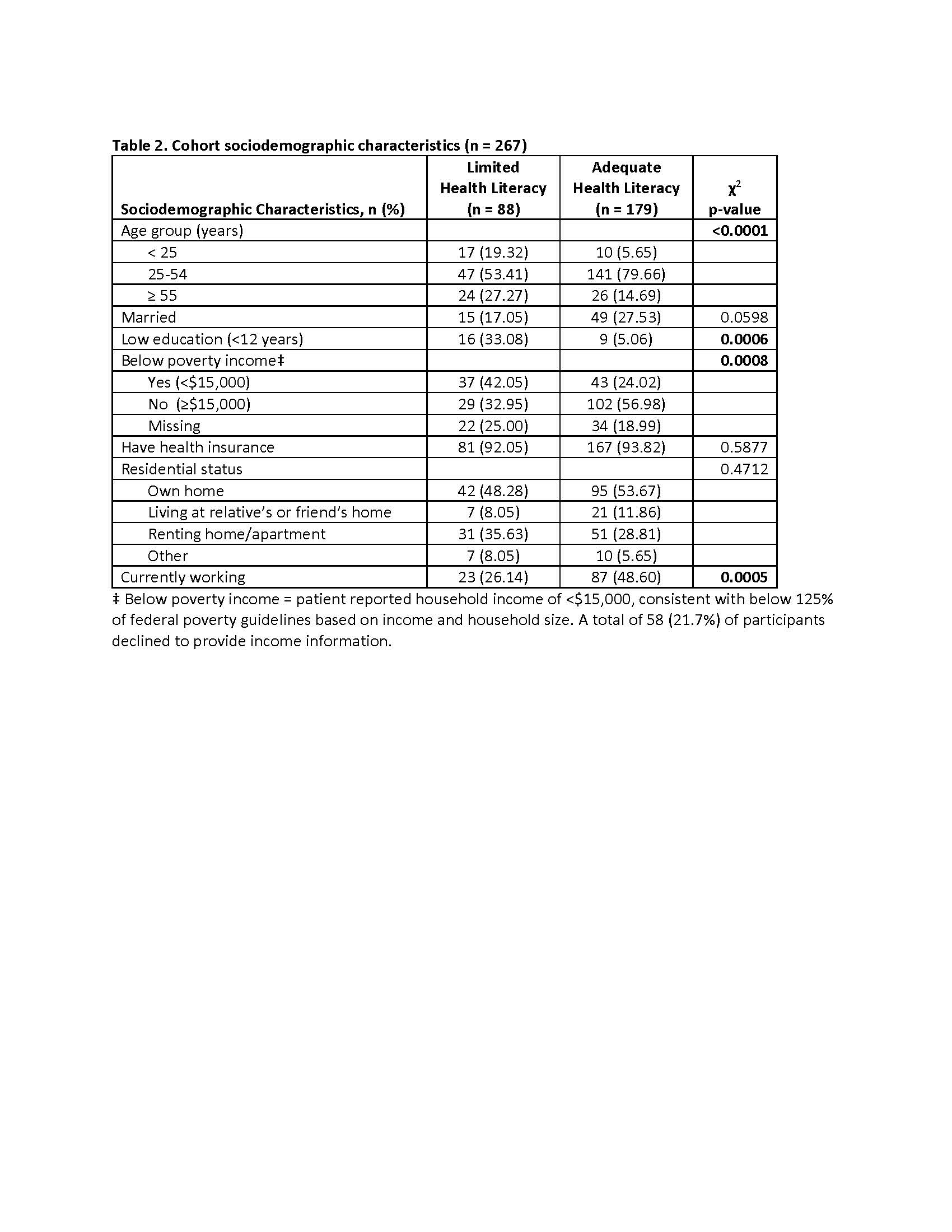Background/Purpose: Health literacy (HL) is an important social determinant of health defined as the ability to understand and use health information. Limited HL is associated with worse clinical outcomes including increased hospitalizations and emergency care use and higher disease activity. The purpose of this study was to determine associations between limited HL with patient-reported outcomes and clinical factors, including systemic lupus erythematosus (SLE) disease activity and damage.
Methods: This study utilized baseline data obtained from the PALS (Peer Approaches to Lupus Self-Management) program, a randomized controlled trial to examine whether a culturally tailored peer mentoring intervention improves disease self-management, disease activity and quality of life (QOL) among black females with SLE. The 3-item Chew Health Literacy Screen was used to determine HL of participants; scores were dichotomized as reporting within the “limited” HL range on any one item. Outcome measures including Patient Activation Measure (PAM), Lupus Self-Efficacy Scale, and Patient-Centered Care Modified Picker Survey; disease activity (SLAQ) and damage (SA-BILD) were also obtained. Generalized Linear Models were used to examine the associations of limited (vs. adequate) HL status with clinical and patient-reported outcomes with covariate adjusted model derived estimates, controlling for education, income, and age, reported.
Results: Of the 267 black female SLE patients, 33% had limited HL (Table 1) with significant socioeconomic disparities found in younger patients, those with < 12 years education, below poverty annual household income, and lower employment rates compared to those with adequate HL (Table 2). In covariate-adjusted analyses patients with limited HL were significantly more likely to have lower patient activation [PAM: mean difference -2.83 (standard error 0.67)], lower self-efficacy [by Lupus Self-Efficacy composite: -13.17 (3.07)], higher lupus damage [by SA-BILD: 0.88 (0.37)] and higher disease activity [by SLAQ Specific Symptom Severity Score: 4.43 (1.60)], compared to those with adequate HL (Table 3). Those with limited HL reported worse patient-centered care [1.79 (0.43)] and were more likely to report difficulty in (1) getting answers to questions that are understandable, (2) having physician take enough time to answer questions, and (3) getting as much medical information as they wanted from their physician, compared to those with adequate HL (all p< .05).
Conclusion: SLE patients with limited HL represent a particularly vulnerable population with significantly disparate and worsened health outcomes including reduced patient activation, worse patient-centered care especially around physician/patient communication, worse self-efficacy, and higher lupus damage and disease activity compared to those with adequate HL. These findings suggest limitations in HL may impair clinical care in multiple domains ultimately contributing to higher disease activity and morbidity/damage, and is important to address in clinical care and future interventions in SLE.
To cite this abstract in AMA style:
Maheswaranathan M, Boan A, Ramakrishnan V, Johnson H, Rose-Smith J, Dismuke-Greer C, Egede L, Oates J, Williams E. Association of Limited Health Literacy with Clinical and Patient-Reported Outcomes in Systemic Lupus Erythematosus: An Analysis from the Peer Approaches to Lupus Self-Management (PALS) Program [abstract]. Arthritis Rheumatol. 2021; 73 (suppl 9). https://acrabstracts.org/abstract/association-of-limited-health-literacy-with-clinical-and-patient-reported-outcomes-in-systemic-lupus-erythematosus-an-analysis-from-the-peer-approaches-to-lupus-self-management-pals-program/. Accessed .« Back to ACR Convergence 2021
ACR Meeting Abstracts - https://acrabstracts.org/abstract/association-of-limited-health-literacy-with-clinical-and-patient-reported-outcomes-in-systemic-lupus-erythematosus-an-analysis-from-the-peer-approaches-to-lupus-self-management-pals-program/



